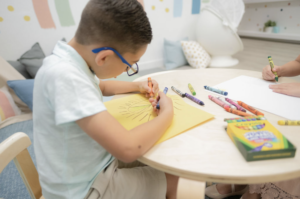
Did you know that speech therapy and language therapy focus on different aspects of communication? Both services are provided by a speech-language pathologist, but the skills targeted in each type of service are different and address a variety of communication challenges.
How can I tell if my child needs “speech” (articulation) therapy?
- It may be difficult for you to understand your child
- It may be difficult for your child’s peers or other adults to understand your child
- It may be difficult for your child to produce certain sounds correctly in words, phrases, or sentences.
As your child’s speech sounds develop, they may distort, omit, or use substitutions for specific sounds. When sampling your child’s speech, it is recommended to listen to their sound productions across different settings. For example, you may choose to video your child narrating their play, talking with a sibling, or answering questions about their day. If you think your child may be experiencing difficulty mastering certain sounds or you think they may have a speech sound disorder, reach out to their pediatrician. They may write you a referral for a formal speech and language evaluation by a speech-language pathologist. In addition, speech therapy can also focus on fluency, which is the smoothness and rhythm of our speech, or on voicing challenges, which is how our vocal folds and breath to make sound. If you are noticing more “bumpy” speech when your child is speaking, especially over the age of 4-5 years of age, or your child sounds hoarse, a speech evaluation may be warranted.
How can I tell if my child needs “language” therapy?
They may have difficulty with:
- Building a vocabulary / combining words to form phrases or sentences
- Following directions (single and multi-step)
- Answering a variety of questions
- Communicating effectively with peers and adults
As your child grows, their receptive and expressive language skills will emerge. As your child develops their communication skills, they will begin to label objects to make comments and requests, combine words to form phrases and sentences, and follow multi-step directions. With time, they develop the skills needed to answer a variety of different questions, retell stories, and communicate effectively with peers and adults. If you have concerns that your child may not be meeting their developmental milestones for language, reach out to their pediatrician as they may be willing to write a referral for a formal speech and language evaluation.
It is possible to have difficulties with speech, language, or both. Having trouble understanding what others say could indicate a receptive language difficulty. Having problems sharing our thoughts, ideas, and feelings could be indicative of an expressive language difficulty. It is possible to have both a receptive and an expressive language deficit.
When we have trouble saying sounds, are not as fluent when we speak as compared to same-aged peers, or have voicing difficulties, this could indicate a speech deficit.
If you have any questions or would like to schedule a speech-language evaluation, please reach out to us at the office at (407) 904-1600 or via email at FLAdmin@riseservicesinc.org. We have immediate openings for speech therapy at this time!
